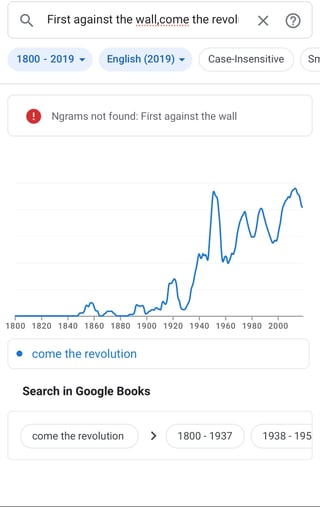background
The phrase:
- You’ll be first against the wall, when the revolution comes or,
- Come the revolution, you’ll be first against the wall and variants thereof, particularly the shortening & implicitizing
- First against the wall
- (and sometimes, rarely in my experience Come the revolution)
- And apparently the abbreviation FATW is common enough to rate capture in TFD¹.
Is frequently used in several contexts, particularly sincerely-held political discourse as well as parody of the same.
Strangely enough, despite my experience with the commonness of “First…” vs the near-absence of “Come…”, Google nGrams has the opposite opinion:
definition
For those who haven’t encountered it before, the UD entry is a reasonable start:
'First against the wall'. Refers to an outgoing elite who will face the firing squads 'when the revolution comes'.
Though I dispute it is limited to the elites; when expressed sincerely (or an approximation), it can and has been aimed at any target wished. It is more frequently, in my experience, used sincerely by holders of left-wing political views than RW (which makes sense given the following).
The phrase speaks of violent revolution and retribution upon one’s enemies; this smacks to me more of the Jacobins and the Leninist-Trotskyist crowd than, say, Mussolini’s fascism.
To my imagination, those revolutions, or a popular model of them (eg film, novels, etc), are the most likely source.
question
But as the standard literature seems to have a lacuna here, I can’t be sure of that, nor even a sense of time (eg in French in 1795 or English in 1965 during the US civil rights movement).
So, then, really, when and where did this phrase originate?
- I’d like to see hard evidence; speculation I have enough of.
- If this was an “astroturfed” term coined or popularized by some movie or book etc, I’d love to hear about that².
- If it had French or other origins, I would welcome that background before discussing its borrowing into English.
¹:Which is the only reference I could find in any professional dictionary.
²:Several places I found on the internet seemed to have first encountered it in Douglas Adams’ Hitchhiker’s Guide to the Galaxy (PhraseFinder, Reddit), but I’m doubtful he introduced it, as much as I love him and his work.

